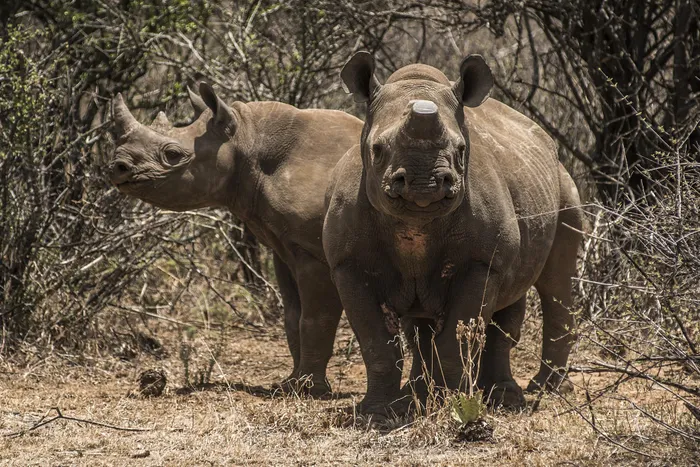Rhino trust dispute reaches Supreme Court of Appeal

A dispute over the management of a rhino sanctuary in Bela Bela, South Africa, has escalated to the Supreme Court of Appeal. File photo.
By: Nicola Mawson
An issue over a trust set up to protect rhinos and provide them with a safe space has ended up in the Supreme Court of Appeal (SCA) after one of the trustees allegedly cut out the other two, misappropriated funds, and treated staff on the farm badly.
In Bela Bela, there is a farm run by Rhino Pride Foundation, a trust which is registered under the Trust Property Control Act. The trust is also registered as a non-profit and public benefit organisation.
Rhino Pride Foundation seeks to put an end to the poaching of rhinos for their horns; advance and protect rhinos in South Africa; and provide medical care and facilities to rhinos, including emergency relief and rescue.
This is especially important work, given that rhinos are in danger of becoming extinct. According to the World Wildlife Fund (WWF), “very few rhinos survive outside protected areas. And all five species are threatened, primarily by poaching”.
Thanks to the creation of sanctuaries, rhino numbers have increased in recent years, although they remain vulnerable to poaching, the WWF states.
A veterinarian started a trust way back when. She then became friends with two other people, whom she added to the trust. The veterinarian lived on the farm and was paid R75 000 a month to look after the scarce species.
The Bela-Bela Farm, in Limpopo spends about R675 000 per month on aspects such as staff salaries and extensive security costs to protect the rhinos, which is funded by a donation from an anonymous foreign donor. “Without this funding, the trust cannot protect, treat, and rehabilitate rhinos on the farm,” the SCA ruling handed down by Judge Ashton Schippers reads.
The bulk of the money was secured when one of the trustees (in this case, an appellant) secured a R50 million donation with the anonymous financer. This cash, its sole source of funding, was set to expand the sanctuary, then home to 50 rhinos. In an agreement signed between the trust and the donor, there were “stringent reporting requirements” on the trust’s side, and the donor could terminate the agreement without reason.
And then things began to fall apart. The judgement explained that the appellants voted in March 2022 to have the vet (respondent) removed as a trustee. She failed to, it was alleged, adhere to the budget for improvements on the farm, which created difficulties in reporting to the donor.
“Without the appellants’ knowledge, the respondent’s fiancé became involved in the activities of the trust and its operations on the farm. She appointed her fiancé’s companies as service providers to the Trust. Numerous staff members lodged grievances with the appellants about the abusive behaviour of the respondent and her fiancé, and what they claimed were inhumane working conditions. As to the administration of the Trust, the appellants did not have any access to its bank accounts at the time,” the ruling explained.
A meeting was held, and the vet agreed to go on leave and that her fiancé would depart from the farm. It was also agreed that any spending in an amount of more than R15 000 would be authorised by two trustees. Arrangements were made to ensure that the rhinos were cared for and that security was adequate.
Then, in a blindside move without notifying the other trustees, the vet went to the High Court in Pretoria to prevent her from being removed as a trustee. She won an interdict setting aside the resolution that resulted in her being removed from the trust. At the same time, the vet wanted the court to remove the other two trustees – the applicants in this case.
The High Court ruled, on an urgent basis, that the vet would have “possession and use of the farm” and that she could not be removed as a trustee, nor could her right to occupy the house be interfered with.
Then, Judge Schippers wrote, “The respondent excluded the appellants from all aspects of the trust”. This included denying them access to their bank accounts, email server, accounting software, and all the trust’s WhatsApp groups.
She also told the donor that she was now the only trustee.
This resulted in the donor becoming worried about the administration of the trust. He, or she, wanted to withdraw the rest of the donation, said that there would be no further donations, and wanted certain information from the vet. She didn’t respond to this request.
“The donor’s representatives sent an email to the trustees, expressing their dissatisfaction with the situation,” the ruling said.
In a bit of back and forth, the appellants said the farm wouldn’t be able to continue to run without the money, since the donor wanted spending ceased, and the respondent, in a “startling” response said there are many other donors.
Judge Schippers ruled that the entire High Court ruling be reversed. The vet was removed as a trustee. This allowed the farm’s work protecting rhinos to continue.
However, should it ever be necessary to amend this trust deed in the future, and given that most trust deeds state that the deed cannot be amended without the consent of the founder, this matter could go back to court if it were ever necessary to amend the deed and the vet – who founded the trust in the first place and whose consent might be required – refuses to co-operate, said Louis van Vuren, CEO of the Fiduciary Institute of Southern Africa, on highlighting the case.
“Fiduciary practitioners will do well to study carefully the court’s findings and the interpretation of the relevant clause in the deed and ensure that the provisions of deeds they prepare are aligned to this interpretation [the court’s interpretation],” he said.
PERSONAL FINANCE